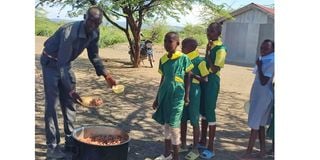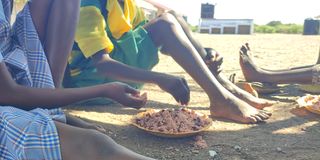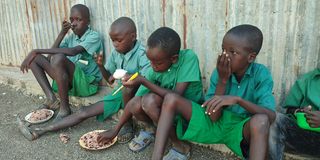Premium
Where biting hunger keeps destitute children in school

Pupils at Logumgum Primary School in Baringo South are served their lunch on May 17, 2024.
What you need to know:
- According to experts, free school meals lead to higher retention and lower dropout rates.
- Most families have been rendered destitute by the recent devastating flooding.
Every morning, Martin Lebene, four, walks more than five kilometres from Eltepes village in Baringo South to Logumgum Primary School.
Donned in home clothes and an improvised school bag strung across his back, the Pre-Primary One pupil is hungry for more than just education. His is also a hankering for the daily school meal of beans and rice.
Lebene is among thousands of learners in the arid Baringo County who are attracted to school by the free meals offered there.
According to experts, free school meals lead to higher retention and lower dropout rates.
This is why the government’s failure to allocate funds for the school feeding programme in the 2024-2025 financial year has sparked panic in arid and semi-arid lands (Asals) where the bulk of learners depend on free school meals due to the high poverty levels.
Logumgum Primary School headteacher Enock Lebene termed the decision as ill-advised: “If we stop the school feeding programme, education here will be paralysed.”
The situation has been made worse by the recent flooding that swept away homes and submerged thousands of acres of farmland, Mr Lebene said.
Devastating flooding
“Most families have been rendered destitute by the recent devastating flooding and have no food, clothing or shelter,” Mr Lebene told the Nation.
A majority of learners at the school walk from as far as Losampurmpur, Eltepes, and Sirata villages, which are more than five kilometres away.
In Logumgum village, the Nation met Rodah Lemeiguran, who sells charcoal to feed her eight children. They live in a tiny mud-walled hut.

Learners at Logumgum Primary School in Baringo South taking their afternoon meal on May 17, 2024.
The little money she makes is not enough to provide them with three meals every day.
“Every morning when I wake up, I’m not assured that I will make money to buy food and other necessities,” she said. A sack of charcoal goes for Sh500, which she may get twice a week.
“My children survive on the afternoon meal provided in school,” she said.
In far-flung villages in Tiaty Sub-county, the land is not suitable for farming and the erratic rains don’t help the situation.
Poverty index
This has created a perpetual state of food insecurity in the region, forcing locals to depend on relief rations, which they receive occasionally. Nalukumongin Primary School headteacher Franklin Lomatong said the school feeding programme has provided learners with a lifeline.
“The poverty index in Tiaty is very high with most families living on less than a dollar a day. In these circumstances, most sleep on empty stomachs for days, and the children who go to school mostly depend on one meal. In such areas, if there is no food in schools, it means no learning and reduced enrolment rates,” Mr Lomatong said.
Most schools in the region are sparsely populated and located at least 10 kilometres apart on average, he noted.
“How do you expect a child to walk to school more than 10 kilometres away, amid the scorching sun, on an empty stomach? They will most probably drop out and opt for herding livestock or worse, be recruited into banditry. ECDE [Early Childhood Development and Education] learners will forfeit schooling completely,” said the headteacher.
The school has 186 learners ranging from Grades One to Six and Mr Lomatong is almost certain that the number could drop to just a dozen if the school feeding programme is stopped.
Baringo South Sub-county Director of Education George Okeyo said over 46,000 learners in the region have benefited from the school feeding programme.
He said the number of primary schools increased from 109 to 130 following the introduction of the initiative in 2020.

Pupils at Logumgum Primary School in Baringo South have their lunch on 17 May 2024.
“Before then, we had 19,000 learners in public primary schools but, today, the population is about 46,000. If the feeding programme is stopped, many children, especially those from pastoralist communities, will drop out because they rely on the one meal in school for survival,” Mr Okeyo said.
Free meals
Baringo South MP Charles Kamuren called on the government to reconsider the decision.
“If not, learning in Asal areas will be paralysed,” the MP said.
At the same time, parents in Kilifi County have urged President William Ruto to review proposals in the 2024-2025 budget, which, if adopted by the National Assembly, will mean millions of learners who are currently benefiting from the programme may go without meals from July.
National Parents Association chairman Silas Obuhatsa warned that the withdrawal of the free meals initiative will affect learning across the country.
“We are pleading with the government to reinstate the programme. It is very dangerous to withdraw funding, considering that food and clean drinking water are the things that attract learners in many poverty-stricken areas,” said Mr Obuhatsa.
He warned that some children may resort to early marriages and drug abuse. He added that the decision will impact negatively on learning in 27 marginalised counties, including West Pokot, Baringo, Turkana, Kajiado, Samburu and Mandera.






